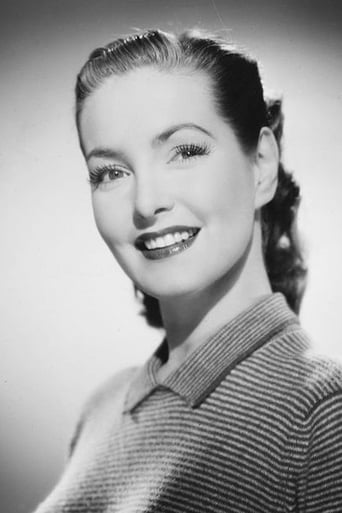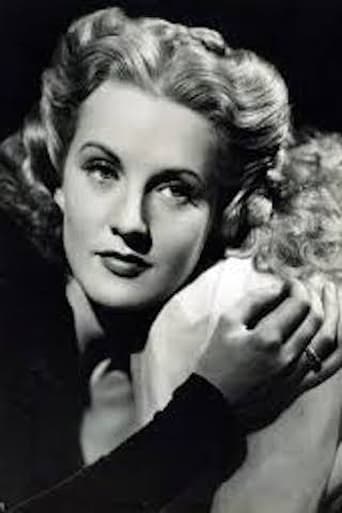Quiet Muffin
This movie tries so hard to be funny, yet it falls flat every time. Just another example of recycled ideas repackaged with women in an attempt to appeal to a certain audience.
Guillelmina
The film's masterful storytelling did its job. The message was clear. No need to overdo.
Bob
This is one of the best movies I’ve seen in a very long time. You have to go and see this on the big screen.
Ken Speckle
There will be a propagandist's agenda behind any film made in and concerning WWII Britain but, where others use a shovel, 'Millions Like Us' lays it on with a velvet glove. It finds no need to make a hero of everyone in British uniform or to chest-thump over every patriotic act. Instead, it warms us to real and ordinary people – people like "us" in the factories, dance halls and Dad's Army – each playing his or her usually unremarked role during the siege of Britain.Here is the writer/director pairing of Sidney Gilliat and Frank Launder at its best. Their dialogue is wonderfully natural, and they allow their expert cast to play for authenticity, with only as much commotion and comedy as will keep us involved in their characters.The evolution of Celia (the delightful Patricia Roc) is particular engaging: the mousy member of an otherwise colourful family becomes our romantic lead while changing believably and almost imperceptibly. With air gunner Fred (Gordon Jackson, wonderful as always) complementing her honesty and shyness, we find a couple about whom we soon care greatly. Any foreigner who would comprehend how Britons relate to each other need merely study Celia's "I don't mind" in answer to both to the most mundane questions and to the longed-for proposal of marriage: this is the level of nuance and understatement from which we come in only a couple of generations.Bigger characters provide a light in which to notice how unassuming Celia and Fred matter to us. Jennifer (Anne Crawford) and Charlie (Eric Portman) play out a side-story, asking what role this war will have in breaking down the classes as the Great War had before it and, with strange prescience, it is the aspiring, salt-of-the-earth Charlie who will not commit to girl-about-town Jenny, foreshadowing the real-world Labour landslide two years later when the have-nots established themselves. While I could mention of any of the supporting players, I shall finish with the low-key comedy of Celia's father Jim (Moore Marriott) and the forever train-travelling double-act of Basil Radford and Naunton Wayne, keeping austere Britain from being sombre.That this story of quite ordinary people turns out to be so compelling while still delivering to the propagandist's brief is a great tribute to all involved. (8.5/10)
MartinHafer
"Millions Like Us" is an awfully good film because it is so incredibly ordinary and simple. That's because it's goal is to provide a snapshot of what life was like for seemingly ordinary women during WWII. It follows one woman in particular, but you also see quite a bit about the other women and their lives as well--and is an invaluable documentary-like look into the WWII era.The film begins just before WWII. Celia (Patricia Roc) and her family are living a relatively mundane and occasionally annoying lives. You don't really feel particularly connected to them or care about these folks at this portion of the film. However, after the war begins, Celia is called up for service--which she is eager to do, as she hates her mundane life with her parents. Unfortunately, she is NOT called up to the women's military service but is sent across the country to work in a war production plant. While she is very disappointed, this is a great thing to focus on, since this is the sort of job MOST British (and American) working women did during the war. I could say a lot more about what occurs to Celia, but it's better you just see it for yourself. Very well done, high on realism, charming as well as sad--well worth seeing. Plus, I loved the fact that repeatedly the film COULD have been jingoistic, extraordinary and ultra-nationalistic but chose instead the more subtle and realistic route instead.
writers_reign
At the time this must have been easy to file as painless propaganda; Launder and Gilliat start off as if attempting to emulate Noel Coward's classic This Happy Breed, we are introduced to a cut-rate Gibbons family and in particular two daughters, one a flighty Queenie clone this time called Elsie (Joy Shelton) and a more grounded Phyllis, now called Cecilia (Patricia Roc) but very soon and perhaps wisely the team realise that even the two of them are light years short of one Noel Coward so they veer off into Rosie The Riveter mode and give us a picture of Women At War which is not unpalatable by any means. There are two romances both slightly improbable, Patricia Roc snags a hopelessly inept Gordon Jackson whilst second female lead Ann Crawford winds up with Eric Portman. Seen today for the first time it failed to bore or embarrass though the England depicted is on the far side of the galaxy compared to what Blair has made of it.
sarah
I first came across this little gem, whilst flicking through the channels on a rainy winters day, suffering with a rather nasty strain of flu. At first i thought it was just another lame wartime romance, that the TV channel usually churns out every afternoon. But on second glance it was actually quite good! Obviously its a blatant piece of British propaganda, aimed at all the people working in factories in the war. A kind of slap on the back if you will, but what i found it to be was a fantastic slice of nostalgia and class issues of the time, which is brought together in a heart warming family drama with a slightly comical look at 1940s life.




